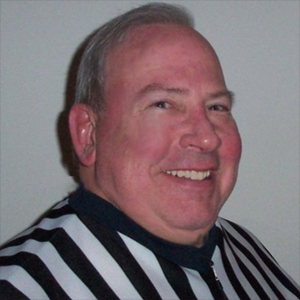
Rndballref
20 Years Experience
Chicago, IL
Male, 60
For twenty years I officiated high school, AAU and park district basketball games, retiring recently. For a few officiating is the focus of their occupation, while for most working as an umpire or basketball referee is an avocation. I started ref'ing to earn beer money during college, but it became a great way to stay connected to the best sports game in the universe. As a spinoff, I wrote a sports-thriller novel loosely based on my referee experiences titled, Advantage Disadvantage
In all the high school games I worked I probably saw the box and 1 a couple times.
NO, unless it is incidental or of no consequence. Normally body contact by a moving defender on a drive to the basket is called a foul.
You can buy the basketball rules books (rules, case book, officials manual) at the National Federation of High Schools website:
www.nfhs.com/c-195-basketball.aspx
You can look at the NBA rules at their website:
www.nba.com/analysis/rules_index.html
You can download NCAA rules at their website:
www.ncaa.org/championships/playing-rules?division=d1
There is no specific prohibition or wordlist which a player cannot use (except unsportsmanlike language such as profanity, racial slurs, etc.)/
iPhone & iPad Technician
 What's something you think Apple does surprisingly POORLY?
What's something you think Apple does surprisingly POORLY?
Casino Dealer
 How do you prove that someone is card-counting?
How do you prove that someone is card-counting?
Antiques Dealer
 What's the most profit you've ever made from a single item?
What's the most profit you've ever made from a single item?
A kick is the intentional contact with the leg or foot. As you describe it sounds unintentional, and therefore not a kick.
Sounds like you are getting a late start but I would never discourage anyone from pursuing their dream. By the way, Michael Jordan was cut from his high school team and clearly he stuck to it.
During normal play, when a player catches the ball in air he is considered to be in the court he alighted from. Suppose Team A has the ball in possession in A's frontcourt. Player A1 jumps from the backcourt, catches the ball in air and lands in the frontcourt. This is a backcourt violation.
HOWEVER, there are two exceptions: 1) if a defensive player jumps from his backcourt, catches the ball and lands in his frontcourt, and 2) on any throw in.
In your question, it is a throw in and so the exception applies. No backcourt violation.
-OR-
 Login with Facebook
Login with Facebook (max 20 characters - letters, numbers, and underscores only. Note that your username is private, and you have the option to choose an alias when asking questions or hosting a Q&A.)
(A valid e-mail address is required. Your e-mail will not be shared with anyone.)
(min 5 characters)
By checking this box, you acknowledge that you have read and agree to Jobstr.com’s Terms and Privacy Policy.
-OR-
 Register with Facebook
Register with Facebook(Don't worry: you'll be able to choose an alias when asking questions or hosting a Q&A.)